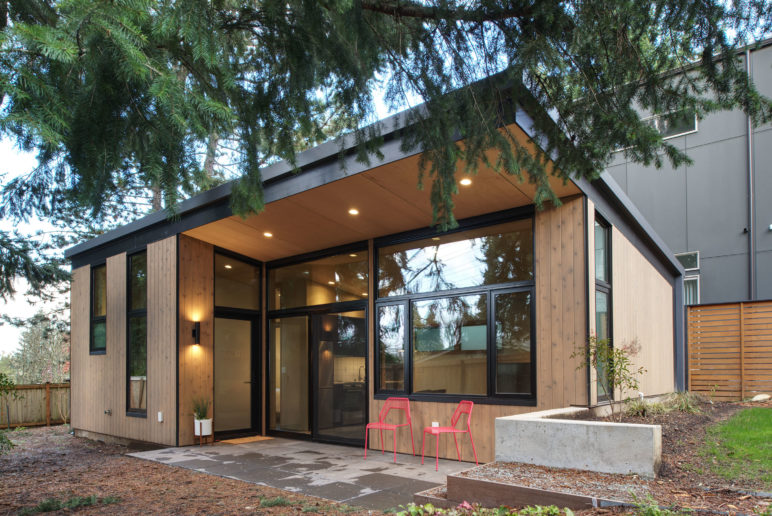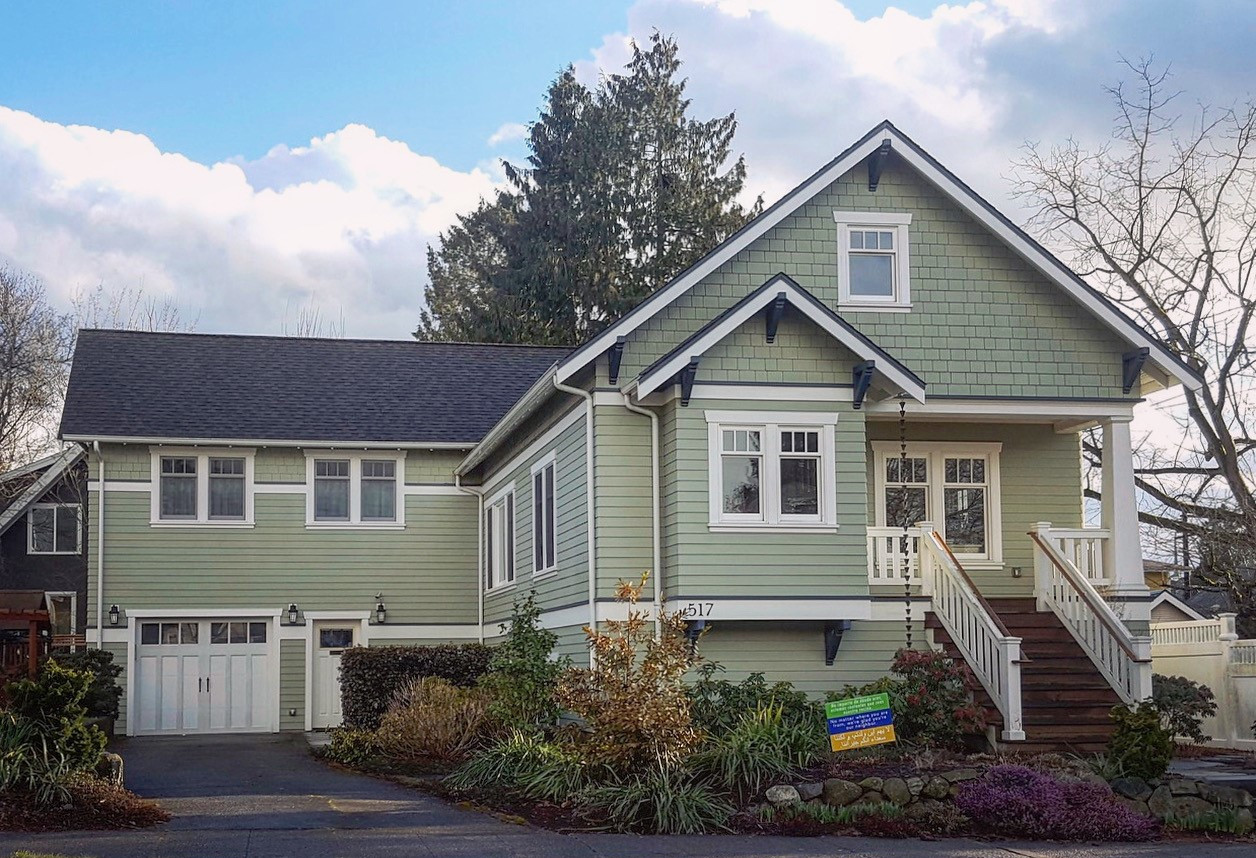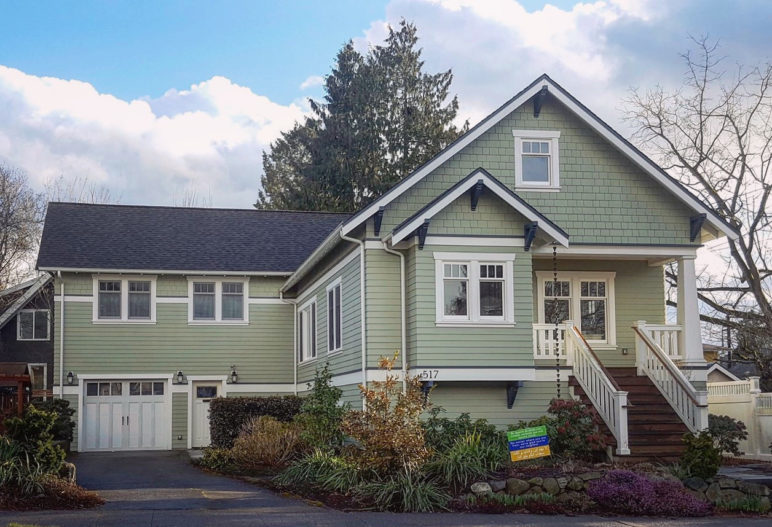UPDATE, May 13: Today Governor Inslee vetoed SB 5235’s provisions concerning ADU owner occupancy requirements.
UPDATE, April 26: On April 7, the House passed SB 5235 and the Senate concurred on April 14. Some representatives worked to repair the damage done by the Local Government Committee, but the final amended version of the bill is so flawed that Sightline has asked Governor Inslee for a partial veto that would remove all the ADU provisions, but retain the part of the bill that lifts caps on the number of unrelated people allowed to share a home.
In our letter to the Governor, we wrote: “Based on our analysis, the final version of SB 5235… would likely amount to a step backward on ADU policy for the state. SB 5235 does technically strike down owner occupancy requirements, but it includes such a tangle of loopholes, contingencies, and delays that, on our assessment, it would yield essentially zero housing benefits.”
UPDATE, March 22: The House Local Government Committee passed a severely weakened version of SB 5235. The amended bill replaced the prohibition on ADU owner occupancy rules with a requirement that cities and counties offer a “hardship exemption” that owners must qualify for to legally live off-site if their property has an ADU.
This policy is a minor improvement at best, slightly reducing risk for owner investment in ADU construction. But it still allows local land use rules to discriminate against renters, perpetuating the legacy of economic and racial exclusion that was an historic impetus for zoning intended to keep out renters. It also allows owner occupancy rules to continue to prevent the addition of rental ADUs to lots where the main house is also rented (typically about one in five houses), and to unfairly target ADUs with a restriction not imposed on any other type of home.
UPDATE, March 10: SB 5235 was heard in the House Local Government Committee and is scheduled for a possible vote on March 17 or 19. If you think it would be a good idea to increase housing choices by lifting arbitrary limits on sharing and renting, please let the committee members know:
Gerry.Pollet@leg.wa.gov (Chair)
Davina.Duerr@leg.wa.gov (Vice Chair)
Keith.Goehner@leg.wa.gov
Dan.Griffey@leg.wa.gov
April.Berg@leg.wa.gov
Eric.Robertson@leg.wa.gov
Tana.Senn@leg.wa.gov
UPDATE, February 24: The Senate passed SB 5235 by a vote of 43 – 6.
UPDATE, February 17: The House Local Government Committee, chaired by Representative Gerry Pollet (D-Seattle), declined to take a vote on HB 1337, killing the bill.
…
Washington lawmakers have another chance in 2021 to advance much-needed statewide standards to allow more granny flats. Two bills are in play this legislative session that would clear a path in neighborhoods across the state for modest homes like mother-in-law apartments and backyard cottages, one targeted, and one comprehensive. And the latter brings a groundbreaking new approach: a financial incentive for cities that adopt a state-defined set of rules.
ADUs are homes tucked into existing communities. They can help curb sprawl, expand flexibility for all stages of life, and add needed workforce housing near jobs and transit.

Both proposals would help more Washingtonians enjoy the many benefits provided by these modest homes known as accessory dwelling units (ADUs). ADUs are homes tucked into existing communities. They can help address our housing shortage, curb sprawl, add home choices and flexibility for all stages of life, and expand economic opportunity by adding workforce housing near jobs and transit. Allowing ADUs can also create local construction and trades jobs. But current rules in many communities needlessly thwart the choice to add granny flats.
As the housing squeeze tightens across the state, excessive restrictions on ADUs are becoming harder for policymakers to ignore. But while a handful of Washington cities have adopted good reforms over recent years, most have not. Legislators considered statewide ADU bills in 2019 and 2020, but so far have only managed to pass a narrow bill that prohibits parking mandates for ADUs near transit. It’s just a baby step toward statewide policy that could unlock the full benefits of more granny flats.
Here are two proposals before lawmakers this session, followed by information on how you can get engaged:
The targeted ADU bill: SB 5235
Senator Marko Liias sponsored SB 5235, which would lift discriminatory prohibitions on renters residing on lots with accessory dwellings. Most Washington cities require the owner to live on-site of properties that have an ADU. These laws:
- discriminate against renters;
- are one of the many forms of zoning rules that perpetuate the legacy of economic and racial exclusion that was an historic impetus for zoning intended to keep out renters;
- impede ADU construction by raising financial risk for homeowners and constraining their future choice of where to live;
- prevent the addition of rental ADUs to lots where the main house is also rented (typically about one in five houses);
- unfairly target ADUs with a restriction not imposed on any other type of home—owners are not required to live on the property of any other type of rental.
For those reasons, removing owner occupancy laws is nationally accepted best practice, see for example, these reports from UC Berkeley’s Terner Center and from AARP. And that’s what SB 5235 does: it prohibits cities and counties from requiring owners to live either in the main house or in the ADU. It grants an exception allowing the laws in cases where the owner has five or more properties with an ADU. The exception does not apply to nonprofit housing providers.
At least 89 Washington cities impose owner occupancy rules, including Spokane, Bellevue, Kent, Everett, Redmond, Shoreline, Bothell, Edmonds, and Lynnwood. Some of these cities—Bellingham and Renton, for example—allow exemptions, but the risk and hassle of the extra bureaucratic process can still dissuade owners from pursuing ADUs. A few cities—Monroe and Connell, for example—take the restriction even further, outright banning ADUs from being rented out in all cases.
Cities that have recently jettisoned owner occupancy requirements for ADUs include Seattle, Tacoma, Olympia, Yakima, Burien, and Kirkland. Oregon and California both passed bills banning them statewide.
Some policymakers have raised concerns that not requiring owner occupancy could allow too many ADUs to get used for short term rentals (STRs) like Airbnb, and not provide long-term housing for residents. The solution is to regulate STRs directly, not indirectly with owner occupancy laws that also have all the downsides described above.
For example, Seattle adopted a law that caps the number of STRs any individual owner can have to two. That means if they’re not living on site, the owner couldn’t STR both the house and its ADU, only one or the other. So in terms of the potential number of STRs on a lot, it’s no different from the case of a lot with just a house, where one STR is permitted. Oregon’s and California’s laws banning ADU owner occupancy laws are both mute on STRs.
(Note: SB 5235 also lifts local caps on the number of unrelated people allowed to share a home, more on that here. These restrictions apply to ADUs and can curtail their use as rentals.)
The comprehensive ADU bill with incentives: HB 1337
Representative Mia Gregerson’s ADU bill, HB 1337, tackles the full spectrum of regulatory barriers, including owner occupancy laws. The bill is also big in a second way: it takes the unprecedented step of providing a state grant of $10,000 for every ADU created as a result of the state-approved rule changes cities or counties adopt.
This financial incentive recognizes that these kinds of changes to land use laws can be challenging—both politically and financially—for local governments to enact. It’s the carrot approach. And cities don’t have to take the carrot if they don’t want it. They can opt to retain their restrictive ADU rules and pass up the state incentive.
In a previous article I gave a general summary of HB 1337. Here, let’s get deeper into the policy weeds.
HB 1337’s model code for ADUs
HB 1337 defines a best practices model code for ADUs that cities and counties must adopt to qualify for the incentive. The code is designed to address the fact that different cities commonly impose a wide variety of regulations that can quash ADUs. Removing some barriers but not others is not sufficient.
The model code is split into three tiers. The top tier addresses four critical ADU barriers: parking mandates, owner occupancy requirements, impact fees, and limits of one ADU per lot. To strike a balance between flexibility and effectiveness, to qualify, cities only have to abolish three of those four barriers.
The second tier includes the following nine provisions, all of which cities and counties must comply with to qualify (for the complete code minutia, please read the bill):
- Must allow ADUs in structures detached from the principal unit (the main house); on any lot that meets the minimum lot size required for the principal unit; and on any lot with a principal unit on a lot that’s nonconforming on minimum lot size.
- Must allow ADU floor area of at least 1,000 square feet or 60 percent of the principal unit, whichever is greater, up to a maximum of 1,200 square feet.
- May not not impose roof height limits, setback requirements, rear yard coverage limits, tree retention mandates, restrictions on entry door locations, aesthetic requirements, or mandates for design review for ADUs that are more restrictive than those for principal units.
- Must allow ADUs to be sited at a lot line if the lot line abuts a public alley.
- Must allow ADUs to be converted from existing structures, such as detached garages, even if they violate current code requirements for setbacks or lot coverage.
- May not prohibit the sale of a condominium unit independently of a principal unit.
- May not charge permitting or plan review fees for ADUs greater than those that would be charged for a similar principal unit.
- May not require public street improvements as a condition of permitting ADUs.
- May not require installation of a new or separate utility connection unless unusual site conditions make it unavoidable.
Cities or counties with ADU rules that already meet all of the requirements in the two tiers above can qualify for the incentive by complying with five of the following nine provisions:
- May not count residents of ADUs against limits on the number of unrelated residents.
- May not establish a minimum floor area for ADUs that exceeds state building code.
- May not count the floor area of an ADU against floor-area-ratio limits on principal units.
- May not count indoor parking, unheated storage, or heated basements against the floor area limits for ADUs.
- Must make the same allowances for ADUs’ roof decks, balconies, and porches to encroach on setbacks as are allowed for the principal unit.
- Must allow ADUs to encroach on setbacks if there is written approval from the adjoining property owner.
- Must apply abutting lot setbacks to ADUs on lots abutting zones with lower setback requirements.
- Must adopt model ADU architectural plans that are preapproved for public use.
- Must establish an amnesty program to help owners of unpermitted ADUs obtain a permit.

More granny flats for Washington communities. CAST Architecture’s “Cedar Cottage,” one of Seattle’s pre-approved designs for detached ADUs. Photo by CAST Architecture, used with permission.
HB 1337’s grants for ADU construction
Once local governments adopt the necessary ordinances to comply with everything described above, they qualify for state grants based on the number of ADUs constructed annually in excess of the average production rate over the prior five years. This adjustment more or less ensures that only the new ADUs directly resulting from the code changes count toward the grants.
But ADUs generate more than just sales tax. The extra property value created by new ADUs boosts the property tax, year after year. And every time a property with an ADU gets sold, the ADU will boost the real estate excise tax collected by the state. All told, HB 1337 would likely lead to a net increase in state tax revenue.
And $10,000 per new ADU could add up to a grant that has a real impact on a city’s budget. After adopting ADU rules matching most of what’s proposed in HB 1337, Tacoma’s permit applications rose from a historic average of six per year to 111 per year. Not all applications become ADUs, but Tacoma’s experience suggests that under HB 1337, the city would have been eligible for an annual grant approaching $1 million. In a smaller city, grants in the range of a couple to a few hundred thousand dollars per year seem reasonable to expect.
What’s next for Washington’s two ADU bills?
If you support adding more granny flats in Washington neighborhoods, you can have your voice heard! Here is a guide to talking about these bills and the community benefits of adding more ADU homes.
SB 5235 had its first hearing in the Senate Housing & Local Government committee on January 26. Next, the Committee Chair must assign it to an executive session during which members vote on whether to pass it out of committee. Supporters can contact the committee members and urge them to pass the bill out:
Patty.Kuderer@leg.wa.gov (Chair)
Mona.Das@leg.wa.gov (Vice Chair)
Phil.Fortunato@leg.wa.gov
Chris.Gildon@leg.wa.gov
Shelly.Short@leg.wa.go
Annette.Cleveland@leg.wa.gov
Liz.Lovelett@leg.wa.gov
Jesse.Salomon@leg.wa.gov
Judith.Warnick@leg.wa.gov
HB 1337 is scheduled for its first hearing in the House Local Government committee on February 3 at 10am. Up to one hour prior to the hearing start time, anyone register their support or sign up to testify live at the hearing. Written testimony can be submitted up to 24 hours after the hearing start time. Start at this link, choose the Local Government committee and then HB 1337. (Those interested in testifying live, please email me: dan@sightline.org.)
Supporters can also contact the committee members:
Gerry.Pollet@leg.wa.gov (Chair)
Davina.Duerr@leg.wa.gov (Vice Chair)
Keith.Goehner@leg.wa.gov
Dan.Griffey@leg.wa.gov
April.Berg@leg.wa.gov
Eric.Robertson@leg.wa.gov
Tana.Senn@leg.wa.gov











